The Student Room
Overview
The Student Room (TSR) is a forum aimed at young people. There is a focus on school and university, though spaces are reserved for non-academic discussison. The service is aimed at a UK-audience [2]. Though much more generalised than the social network that we are proposing, it will be useful to see an example of what services students might find useful.
Functionality
Forums
The forums comprise the majority of the content on The Student Room. Forums are one of the older types of online social networks, with the Delphi forums reportedly being available as early as February 1983 [3]. Based on personal experience, the TSR forums are very typical of forums in general, so if we encounter forums in further posts, we will only focus on what makes them unique (if anything).
Although the forums are public and users are identified by chosen usernames only, I am going to err on the side of caution and redact potentially identifying information.
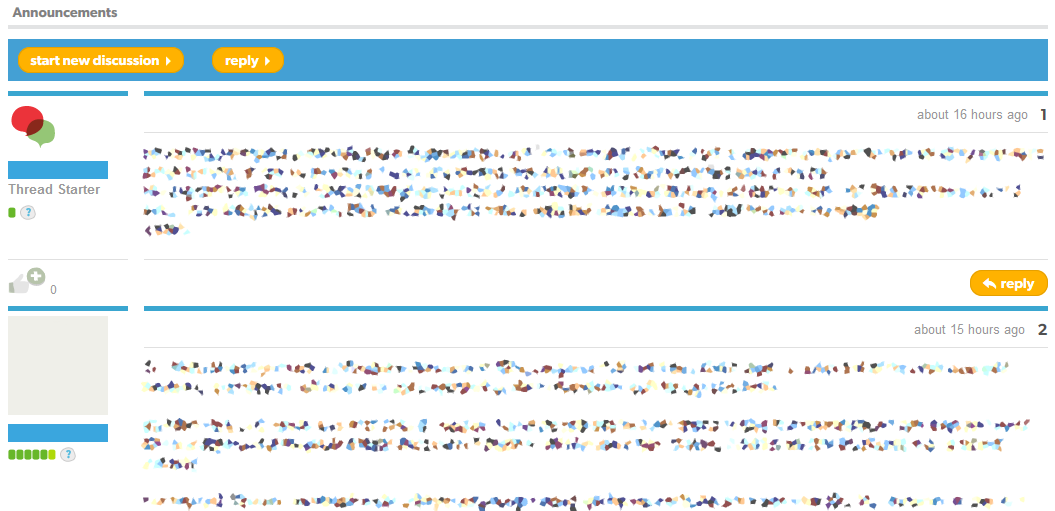
The ‘discussions’ on the forums are a series of text posts made by registered users. The posts are displayed in a strictly chronological order.
This is a form of asynchronous communication, because the involved parties do not have to be logged in at the same time to see each other’s contributions. They are also conducted publicly, so anyone on the forum can see what you have posted.
Rating systems
Post Ratings
Helpful replies can be upvoted using the ‘thumbs up’ icon located under the poster’s details. This button turns green when it is clicked by at least one user, and keeps a note of how many users have clicked it. This is an example of a ‘Paralinguistic Digital Affordance’ (PDA), a lightweight method of communication that does not rely on words [4].
The intended use is likely to highlight posts that a user agrees with, promoting these ideas without having to reiterate them (or using space with a short post saying that they agree). Because of the fixed chronological order of the forum and the size of this button, highly rated posts are not visually emphasised over lower rated posts, meaning that the effect is subtle.
PDAs can be a inaccurate measure of the worth of social media content, because some users may use them ironically or habitually [4]. The frequency of this varies between types of social media.
User Ratings
You can also give ‘reputation’ to a particular user by navigating to their profile page. This is intended to acknowledge helpful users rather than individual posts [5].
User Repution
Users are assigned ratings based on their reputation on the forums, represented as green/yellow pips below their profile image. This reputation is calculated from a user’s received post and account ratings, and influences how much weighting their own ratings are given (more respected users give out more reputation at once) [5]. Reputation also decreases gradually when a user remains offline for more than 100 days.
Clearly, TSR wants to give the most influence to those already considered trustworthy. How reputation influences a website and propagates through its userbase appears to be a sufficiently complicated topic that is worthy of its own post (which I will work on later). If we want to include a similar system into our website, we should be careful about how it is implemented.
Organisation of Topics
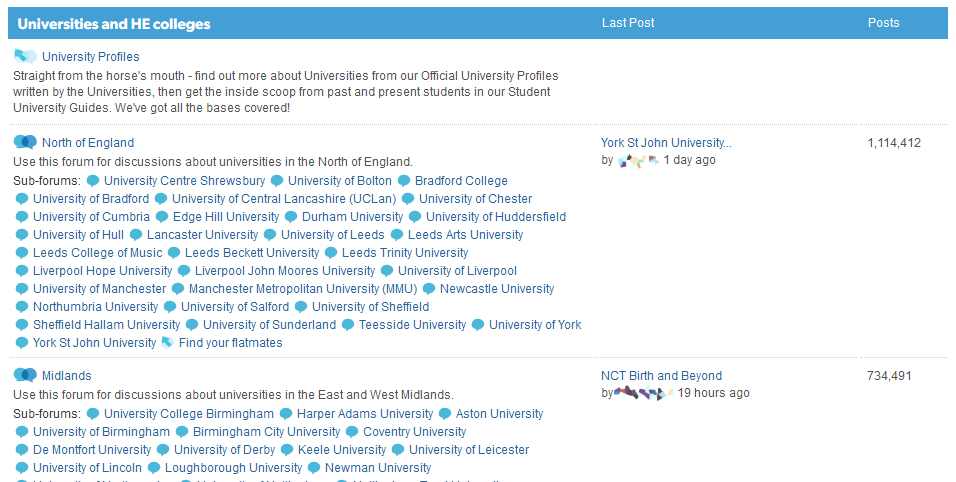
Topics are arranged in a tree structure for hierarchical sorting of forum threads.
To see what TSR deems most useful to for a social network aimed at students, we can look at the selection of top-level forum topics that they promote on their home page. These are topics that we should be thinking about as we design our own service, as they may be relevant to our audience.
Various non-academic stuff.
- Lifestyles.
- Entertainment.
- News.
These are general forums without any specific focus on student life. While young people evidently want to talk about these things (considering the age-range of teenagers to yound adults, I find it unsurprising that the most frequented topic is ‘Relationships’), they are topics that will be better served by general purpose social media services, and are perhaps less important to our system.
Study help.
These topics are further sorted by subject. Here we see some limitations of the forum format. The threads that the user sees when entering a topic are merely the most recently active ones. Despite the post rating system, useful topics can only persist if they continue to receive replies, or are ‘pinned/stickied’ (by an administrator/moderator) to the top of the topic. There is also no way to filter by level of study, and the board contains a mix of GCSE and A-Level threads.
This puts the pressure on the search feature to yield useful results, or requires the user to make new topics (with no guarantee they will get good replies).
University Life/Study.
Topics for specific Universities.
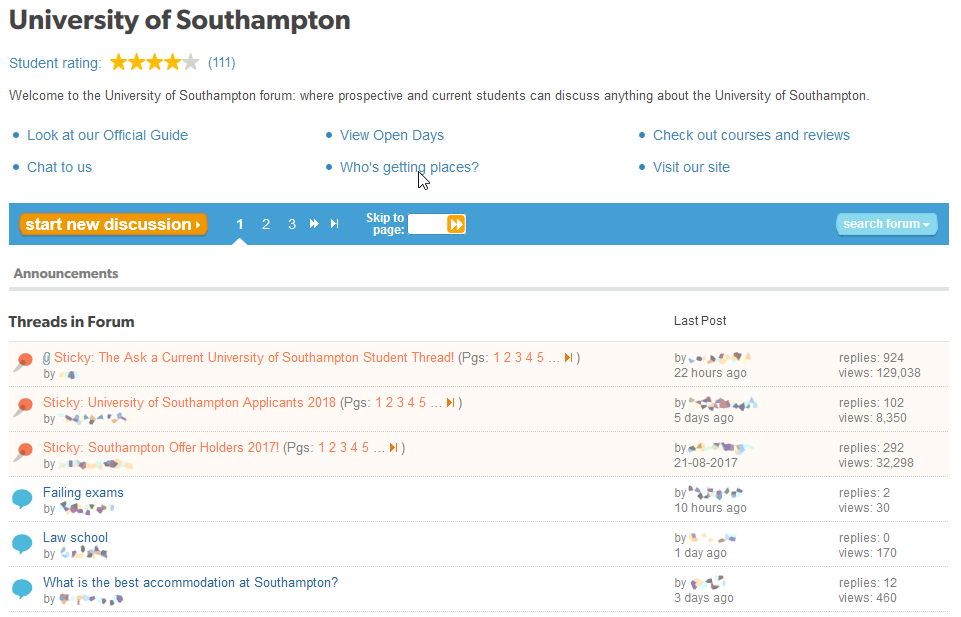
Topic pages for universities include links to some static pages as well as a board of forum threads.
The university page contains links to static pages contianing information relevant to a school student who might be interested in going to study at the university.
You can also send messages to an official representative of the university.
The information pages are filled out by someone from the university, rather than TSR staff. This means that the pages are of variable quality and completeness.
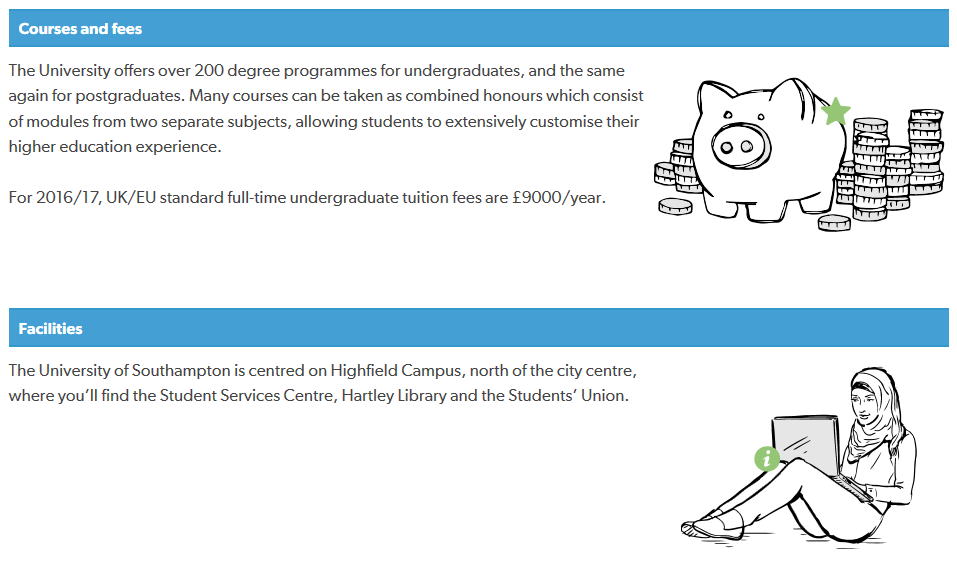
The University of Southampton page is comprised of 5 short sections with basic information about the university.
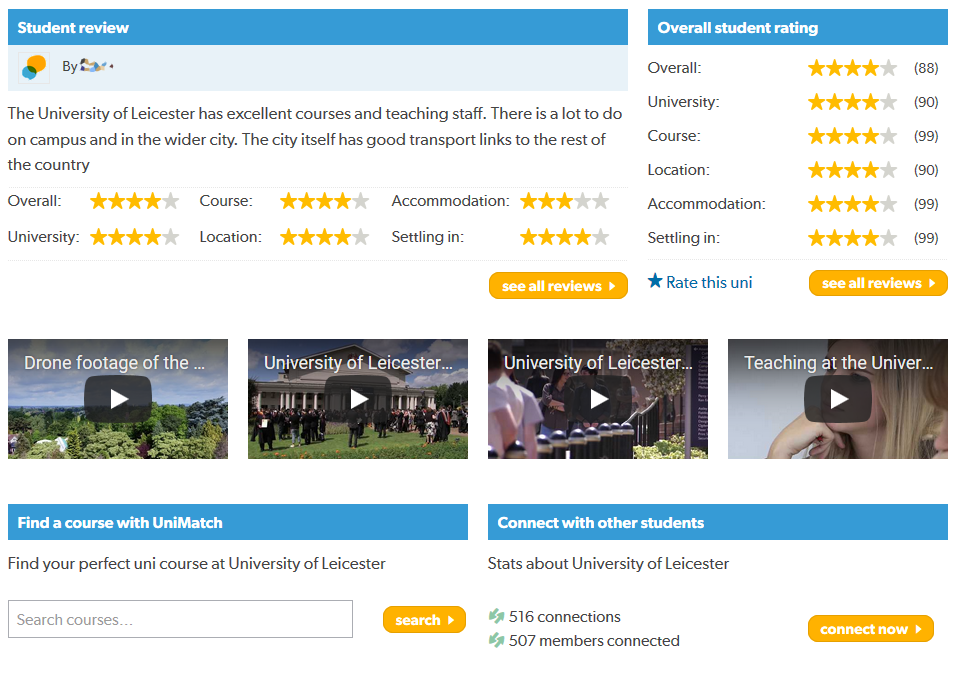
The page for the University of Leicester is nicely formatted, with interactive elements such as reviews, video guides, and search features.
This could be frustrating for users looking for information on a specific university. In our application, where there might be information to fill out for different topics, it might be useful to provide an easy-to-use template to fill out, rather than providing an empty space. This might encourage the users/institutions to cover all of the relevant bullet points, and ensure some level of consistency across topics.
International study
The topics for international study are focused on British students going overseas, rather than welcoming overseas students to Britain [2][6]. This leaves a gap that our system could fill.
Static Information Pages for Students
Contains various guides for topics such as:
- Studying techniques.
- Applying to university.
- Job hunting.
- etc.
Interactive Learning Tools
Exam past papers
Study Resources
Can upload multimedia resources to help other students with study/revision.
- Documents.
- Slideshows.
- Flash-cards.
- Notes.
- Videos.
Some of these are ‘recommended’ by teachers who review the content generated.
Revision Timetable Tool
Personal Statement Tool
Finance
I could not find any specific details on financing. I can confirm that the website serves ads. There does not appear to be anything that a user cannot access with a free account.
Accounts
Users can sign up with:
- Facebook.
- Google+.
- An email address.
Design
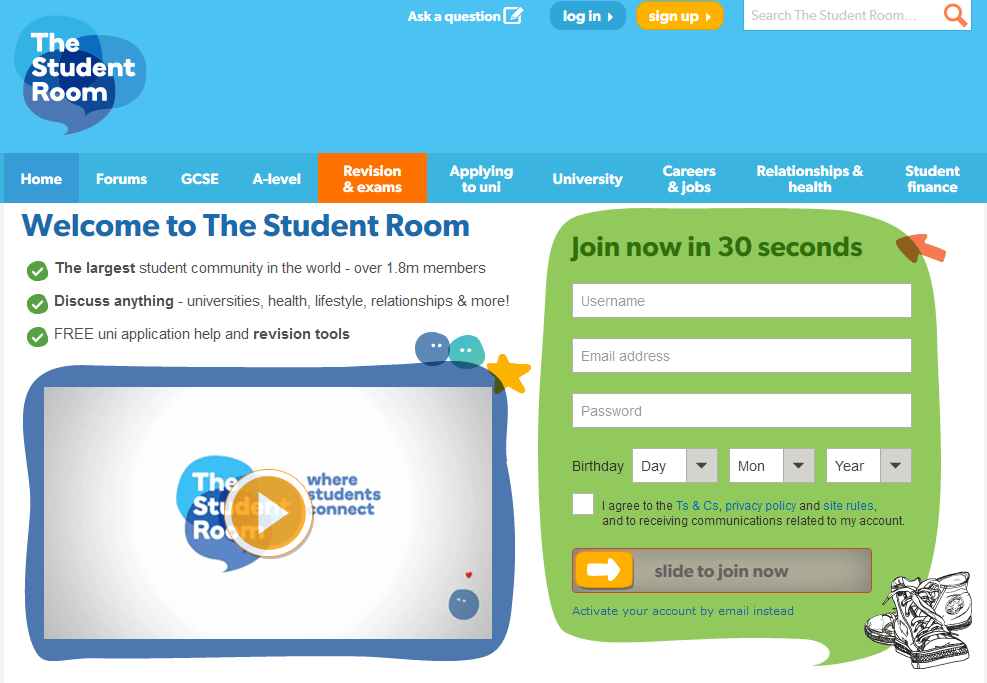
TSR uses lots of bright colours and irregular shapes to give it a playful aesthetic.
Where there is a low density of information, TSR uses many graphical elements to fill the space. The irregular shapes and sketchy images give the website an informal feel, presumably to appeal to the younger audience. In the forums, this aesthetic is restrained to allow the information to be displayed more efficiently.
References
[1] J. Stewart, ‘How does Technology Make Money?’, University of Southampton, 2018.
[2] “About The Student Room – The Student Room,” The Student Room. [Online]. Available: https://www.thestudentroom.co.uk/content.php?r=127-about-the-student-room-where-students-connect&utm_source=facebook&utm_medium=fblikebutton&utm_campaign=cms. [Accessed: 14-Mar-2018].
[3] “Delphi Forums Celebrates 30 Years,” Delphi Forums. [Online]. Available: http://forums.delphiforums.com/delphihistory/messages/261/1. February 2013. [Accessed: 06-Apr-2018].
[4] R. A. Hayes, C. T. Carr, and D. Y. Wohn, “One Click, Many Meanings: Interpreting Paralinguistic Digital Affordances in Social Media,” Journal of Broadcasting & Electronic Media, vol. 60, no. 1, pp. 171–187, Feb. 2016.
[5] “FAQ: The Reputation System”, The Student Room. [Online]. Available: https://www.thestudentroom.co.uk/faq.php?faq=rep. [Accessed: 06-Apr-2018].
[6] “International Study,” The Student Room. [Online]. Available: https://www.thestudentroom.co.uk/forumdisplay.php?f=116&utm_source=facebook&utm_medium=fblikebutton&utm_campaign=forum. [Accessed: 14-Mar-2018].
No comments yet.